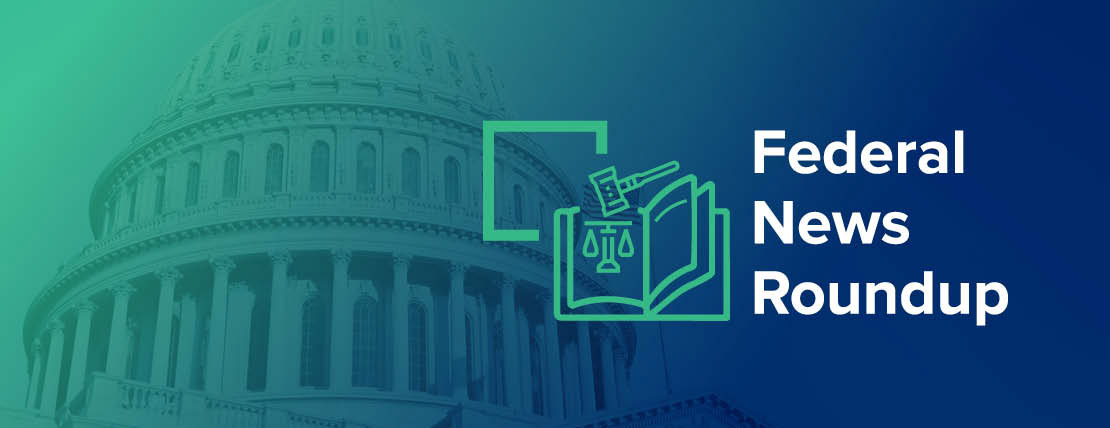- Comp and Benefit Elements in President’s ‘Big, Beautiful Bill’
- DOL Intent on Publishing Retirement Plan Investment Rule
- Legislation Seeks to Auto ‘Reenroll’ Workers into 401(k)s
- Senate Committee to Review Trump’s Nominee for EBSA Post
Comp and Benefit Elements in President’s ‘Big, Beautiful Bill’
On May 22, the U.S. House of Representatives narrowly passed H.R. 1, labeled by President Donald Trump and his administration as “The One Big, Beautiful Bill”. The legislative document, which weighs in at more than 1,000 pages, primarily aims to reform the U.S. tax code. It now advances to the Senate, where it could undergo significant changes before eventually coming to a vote in late June.
The bill currently has several provisions that address employee compensation and benefits, including:
- Improved eligibility and contribution limits for health savings accounts (HSAs), including provisions for Medicare-eligible individuals.
- No tax on tip income. A key pledge from Trump’s 2024 campaign, tips will not be taxed for 2025 through 2028, subject to several eligibility restrictions.
- No tax on overtime hours. Another campaign pledge, there will be no tax on overtime hours worked for 2025 through 2028, again subject to restrictions and income limitations.
- New requirements under the Affordable Care Act (ACA) for eligibility verification and the exclusion of Deferred Action for Childhood Arrivals (DACA) recipients from coverage.
- New restrictions on Employee Retention Credit (ERC) claims and changes to the statute of limitations.
Law firm Buchanon, Ingersoll & Rooney, P.C., provided a summary on the HSA provisions, which, if enacted, would be effective in January 2026.
In regard to broadening HSA eligibility, the law firm stated, “Under current law, individuals must (i) be enrolled in a qualified high-deductible health plan (HDHP), (ii) not be enrolled in Medicare or have a spouse enrolled in a flexible spending account (FSA), and (iii) not have any other disqualifying health coverage. The bill enables Medicare-eligible individuals to maintain HSA contributions and permits those with a spouse enrolled in an FSA to also have an HSA.”
Toward modifications to reimbursement-eligible medical expenses, it stated, “Individuals will be able to use their HSA to pay for sports and fitness expenses (capped at $500 per year for individuals, $1,000 for families). In addition, medical expenses incurred within the 60-day period prior to HDHP coverage would be deemed qualified medical expenses.”
The bill seeks to double HSA contribution limits, which currently sit at $4,300 for self-only coverage (for individuals making up to $75,000) and $8,550 for family coverage (for joint filers making up to $150,000).
Law firm Jackson Lewis, P.C., provided a summary on the “no tax on overtime and tips” provisions.
Toward creating a temporary deduction from gross income for premium pay for overtime hours worked, it stated, “The deduction applies only to compensation paid in excess of an employee’s regular rate of pay, as required under Section 7 of the [Fair Labor Standards Act]. There is no cap on the amount of overtime earnings that an employee may deduct.”
Toward creating a temporary deduction from gross income for tips earned by workers (employees and independent contractors) in “traditionally and customarily tipped industries,” it stated, “The legislation extends an employer tax credit for Social Security taxes paid on tips, currently applicable only to food or beverage service employees, to include tips customarily earned by employees providing beauty services such as hair care, nail care and spa treatments. To deter improper reclassification of regular pay as tips to qualify for the deduction, the treasury secretary would be directed to provide, within 90 days of enactment, a list of industries where tips have customarily been earned on or prior to Dec. 31, 2024.”
Businesses would need to separately report tips and overtime earnings on employees’ W-2 forms and, for non-employees (including gig workers), report payment portions designated as tips.
DOL Intent on Publishing Retirement Plan Investment Rule
The U.S. Department of Labor (DOL) will generate and publish a new rule related to retirement plan fiduciaries’ abilities to consider environmental, social and governance (ESG) factors when they select plan investments. This is according to a letter that the DOL filed with the U.S. Fifth Circuit Court of Appeals on Wednesday, May 28.
In its filing, part of an appeal in the case State of Utah v. Walsh, the DOL outlined its intent to:
- Rescind a 2022 DOL ESG rule, titled “Prudence and Loyalty in Selecting Plan Investments and Exercising Shareholder Rights.” This rule, promulgated during the administration of then-President Joe Biden, didn’t require plan sponsors to consider ESG factors when making investment decisions; it did, though, encourage them to weigh such factors as a “tiebreaker” if two or more investment options offered the same rate of return.
- Request that the Fifth Circuit pause its consideration of an appeal of a lower court’s dismissal of a lawsuit challenging that 2022 rule.
- Engage in new rulemaking on the subject of the challenged rule.
Toward the final bullet point, the DOL stated, “This rulemaking will appear on the department’s Spring Regulatory Agenda, and the department intends to move through the rulemaking process as expeditiously as possible.”
Political and legal observers predict a new DOL rule likely will resemble a similar rule implemented during President Trump’s first term, which outlined that fiduciaries need only to consider “pecuniary factors” when making investment decisions.
Legislation Seeks to Auto ‘Reenroll’ Workers into 401(k)s
On May 21, U.S. Sens. Tim Kaine (D-Virginia) and Bill Cassidy (R-Louisiana) introduced the “Auto Reenroll Act,” legislation that seeks to help American workers take advantage of available employer-sponsored retirement plans and full employer match offers by permitting more frequent opportunities for employees to opt in.
According to a statement on Kaine’s website, 1 in 4 U.S. workers aren’t enrolled in their employer-sponsored 401(k) plans, and one-third aren’t taking advantage of their full employer matching contribution.
It stated, “Proactively encouraging these workers to enroll is critical because many choose not to participate in these programs when they are first hired or making entry-level wages, but then may never be promoted to reconsider that decision or increase their contribution as their income increases. That can lead to significant confusion — 59% of workers who are not participating in their workplace plans thought they were participating when surveyed.”
The legislation would address this issue by amending safe harbors in the Employee Retirement Income Security Act (ERISA) and the Internal Revenue Code to permit plan sponsors to reenroll nonparticipants at least once every three years, unless the individual affirmatively opts out again.
Senate Committee to Review Trump’s Nominee for EBSA Post
The Senate Health, Education, Labor and Pensions Committee will consider the nomination of Daniel Aronowitz, President Trump’s pick to head the Employee Benefits Security Administration (EBSA), during a hearing scheduled for Thursday, June 5.
Aronowitz is a labor lawyer and blogger that, until April, was president of Encore, a company that insures employers against liability for violating their fiduciary duty as sponsors of employee benefit plans.
If confirmed to lead EBSA, Aronowitz would be responsible for administering, regulating and enforcing the provisions of Title I of ERISA, including the development and implementation of regulations affecting employer-sponsored health plans and employer-sponsored retirement plans. He also would serve as the assistant to Secretary of Labor Lori Chavez-DeRemer.
Editor’s Note: Additional Content
For more information and resources related to this article, see the pages below, which offer quick access to all WorldatWork content on these topics:








